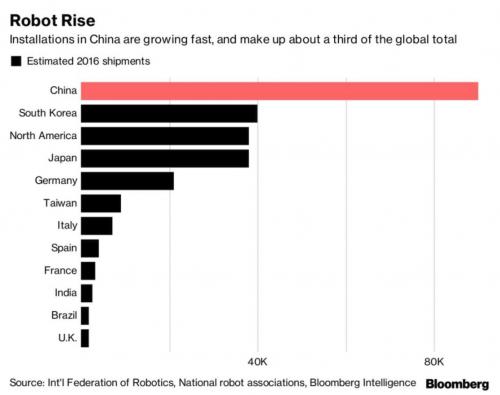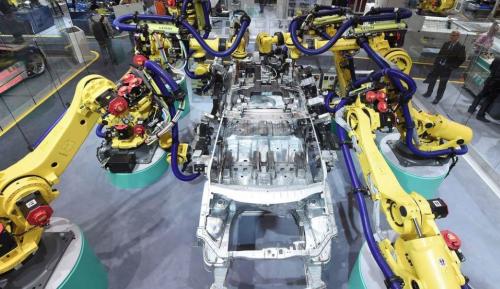As we’ve reported in the past, skyrocketing wages in mainland China have caused the adoption of robot workers by the country’s manufacturers to accelerate rapidly in recent years, cementing the country’s position as a world leader in industrial automation.

But while that trend has been widely cited and is widely known, particularly as the US plays catch up with one of its most prominent economic rivals despite President Donald Trump’s promises to bring back manufacturing jobs, what many don’t know is the worldwide boom in industrial automation has largely been driven by one press-shy Japanese company called Fanuc.
Fanuc, as Bloomberg Businessweek reports, manufacturers robots that can perform all manner of functions. From constructing complex motors to making injection-molded parts and electrical components. At pharmaceutical companies, Fanuc’s sorting robots categorize and package pills. At food-packaging facilities, they slice, squirt, and wrap edibles.

Sales of industrial robots in the US soared during the first quarter of 2017 as manufacturers spent more than half a billion dollars on new products bound for auto manufacturing centers in Indiana, Michigan and Ohio – and the overwhelming majority of these robots are being manufactured by Fanuc.
In the first quarter of 2017, North American manufacturers spent $516 million on industrial robots, a 32 percent jump from the same period a year earlier. A study published by the Brookings Institution shows many of them are ending up in steel and auto manufacturing centers such as Indiana, Michigan, and Ohio. According to the report, there are about nine industrial robots for every 1,000 workers in Toledo and Detroit—three times the figure for 2010. Many of these robots are Fanuc’s. Its machines are also in Tesla Inc.’s Gigafactory, in Nevada, lifting heavy chassis and delicately assembling battery trays, among other tasks. Its sorting robots, meanwhile, are ubiquitous at Amazon.com Inc.’s massive warehousing and shipping facilities.











Leave A Comment